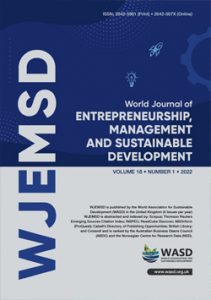An ecological analysis of four competing approaches to sustainability development : Integration of industrial ecology and ecological anthropology literature, Prof. Seleshi Sisaye
Prof. Seleshi Sisaye
Palumbo‐Donahue School of Business
Duquesne University, Pittsburgh, Pennsylvania
USA
Email: sisaye@duq.edu
DOI: 10.1108/20425961211221606
Purpose: The purpose of this paper is to trace the impact that the ecological approach has in international development programs in both the USA and Europe. It discusses the applications of sustainability by international donor agencies among bilateral and multi‐lateral organizations in developing economies. It outlines the influence of sustainability in the US Federal Government agencies to protect and maintain environmentally‐based development programs.
Design/methodology/approach: The paper compares industrial ecology and ecological anthropology approaches to sustainability development. It discusses their policy implications for international development assistance programs. It describes how anthropological and sociological approaches to sustainability have impacted the development policies and programs of bilateral and multilateral organizations, as well as those of multi‐national corporations.
Findings: There are common sustainability trends among the four competing donor organizations in approaching sustainability development by bilateral and multilateral international development organizations. These organizations – the United States Agency for International Development (USAID), the World Bank, the United Nations and its affiliated Organizations, and the US Federal government agencies, for example, the Environmental Protection Agency – have shaped and influenced the policies and programs of sustainability development in business organizations and in developing economies.
Originality/value: Sustainability has been a subject of interest in international development assistance programs in both bilateral and multilateral organizations since the 1970s. Over time, the subject of sustainability received prominence in the developed world. It can be argued that sustainability has its roots in the developing economy and has been adapted/modified to meet the environmental and natural resources conservation and management policies of the developed economies.
Keywords: United States of America; Europe; Sustainable development; Resources management; Sustainability development; Ecology and resources management; Sustainability business reporting; Social anthropology.
Citation: Sisaye, S. (2012), "An ecological analysis of four competing approaches to sustainability development : Integration of industrial ecology and ecological anthropology literature", World Journal of Entrepreneurship, Management and Sustainable Development, Vol. 8 No. 1, pp. 18-35. https://doi.org/10.1108/20425961211221606

